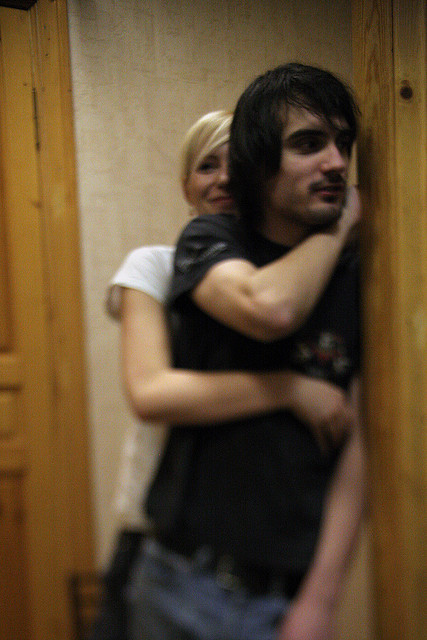I’ve never understood why some people are afraid to love.
Even after being dumped, duped, and left broken-hearted by past lovers, I still didn’t think there was anything to fear. I was willing to suffer through a broken heart if it came after months of joy and adventure. I thought that heartbreak was a part of love.
Until I fell in love with someone who was chronically ill.
It never occurred to me that there could be something worse than breaking up. Loving my partner, and being afraid that he might die before me, feels like someone is taking an ice cream scoop of my soft, pink heart.
Through that fear seeps the icy realization that we are all impermanent; that everyone I love will die, some before me and some after. How do humans continue to live while knowing that truth?
My friend’s cousin is in his senior year of high school. He’s dating a gorgeous girl and they love each other a lot. I can recognize that feverish teenage love. However, they’ve decided to go to different colleges; they know they will break up at the end of this summer. Even with this impending doom, they are totally and lovingly engaged in their relationship.
I’m trying to extrapolate their example out into my whole life, into my death. My mind is like a computer, struggling without enough RAM to solve this problem. How do I stay present while knowing we’ll all leave this plane, while knowing that my loved one may leave before me, or that I could unwittingly leave him to suffer alone? How do I hold this, the most brutal truth of life, and still remain engaged in it?
I see people disengage from this truth all the time. When we hurt ourselves, mentally or physically, consciously or unconsciously, we’re disengaging from the miracle of being alive. When we spend hours of our precious life watching “reality” television, when we pick relentlessly at our skin, or when we get drunk or high, we remove ourselves from the flow of life and disengage from the miracle of being here.
To be engaged, to understand the truth of our fragility, and to live fully in each moment, seems heroic to me. I cannot even conceive of the strength it must take to know that everything will end, and to still experience it without fear. Such strength seems Herculean—but I imagine it would be blissful to be so present to the sensations of being alive. To neither cling to or avoid our experience. To love someone so fully that you are willing to just be here with them, without fearing for the future.
I now understand the existential terror of love. Too bad I’m already three years deep into a relationship with a man I adore, because now I can see what everyone else is busy avoiding. My goose is cooked, the game is up, I’m done in—my only choice now is to grow strong enough to hold both truths: that we will all eventually disappear, and yet the only moment that matters is now.
That duality flies in the face of my whole career path and life goal. I’ve been working so hard to create a future for myself. I do what I love, and I do it 110 percent so that I will be able to do only what I love in ten years. How does the impermanence paradigm affect this model? It seems that what matters is now, and that means letting go of “in order to.”
I’m not willing to work long hours at a job I detest in order to make a lot of money, in order to buy a big house, in order to send my “someday-maybe-future-kids” to a private school, so that they can work long hours at a job they detest. Building a career takes time and I’m willing to do the work—but I want to be engaged in my work; to learn from each moment.
For me, the impermanence paradigm means more presence, and less sacrifice. It means I am not willing to stay up late watching Buffy reruns, because I want to sleep well, rise early, and be ready when the day starts happening. I’m not willing to spend time on relationships that are not fulfilling, inspiring, or supportive. In each moment, I want to be engaged with people and projects that make my life glisten.
If I am washing dishes, I want to be 100 percent present to the soapy water running over my hands. If I am spending time with my partner, I want to be 100 percent present to the love I feel for him. Even if I am wrestling with tragedy, I want to be 100 percent present to the grief, pain, and love that I’m feeling.
Here are some practical steps I’ve taken to become more present and less fearful:
I breathe. When I notice that I’ve mentally left the present and am worrying about the future, I stop what I’m doing and breathe deeply. I notice the details around me, and acknowledge what I’m grateful for right then, in that moment.
I don’t judge. I take note of the physical sensations in my body, without judging them. All of these sensations are part of the human experience—I practice being aware of them, without “fixing.”
I stay aware. In moments of intense emotion, I breathe deeply and stay aware of my body sensations. This does not abate grief or dampen joy, but helps me to integrate those emotions rather than avoid them.
I do what I love. I’ve spent time finding out what I love. Danielle Laporte’s Desire Map is my favorite guide for uncovering what you love and how to do more of it in the world.
I write. I keep a blog and I write about love, fear, mindfulness, creativity, and health.
I only have this moment. What would it take for me to do only what I love, starting now? And what would it take for me to let go of fear?
The shock that came with noticing the impermanence of all of our lives jolted me into clarity, action, and presence.
My to-do list is now full of things that further my dreams, and my relationships are intimate, vulnerable, challenging, and loving. There’s nothing to be afraid of; death is certain. The only way to honor that end is to be present.
There is no room for fear in presence—fear can only exist in the future.
Author: Lily Calfee
Image: Flickr / lafleur
Editors: Sara Kärpänen; Emily Bartran

 Share on bsky
Share on bsky







Read 9 comments and reply